You’ve spruced up the nursery with zero-VOC paint, so now what? Add some fun to the walls with stickers or decals. Whether it’s a woodland, ocean, or space scene, decals can be a quick, easy, and relatively inexpensive way to transform a regular old room into a super cute nursery.
Table of Contents
Don’t just splurge on the first cute nursery decals you spot at the store or online, though. Most stickers are decidedly not eco-friendly or non-toxic. Here are my recommendations for the best non-toxic, eco-friendly nursery decals, followed by a look at what to watch out for when buying nursery wall stickers.
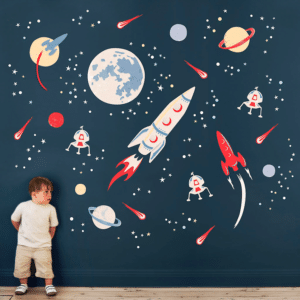
The best eco-friendly non-toxic nursery decals
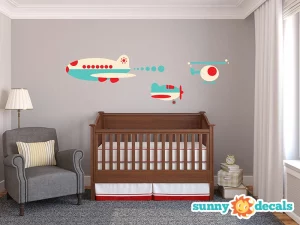
Eco-friendly nursery decal runner up
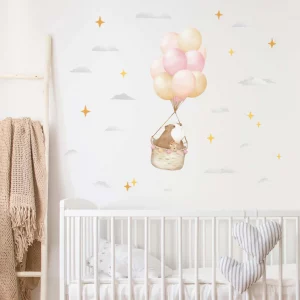
Fully recyclable nursery decals
The problem with conventional decals
Most manufacturers still make nursery decals or wall stickers using plastic. This is typically polyvinyl chloride (PVC), with phthalates and other troublesome chemicals that can off-gas VOCs for weeks, if not months, right next to your sleeping baby. Nursery decals may also feature toxic adhesives, with even those claiming to be eco-friendly using soy-based adhesives that pose their own problems with toxic off-gassing.
Here’s what to watch out for when buying nursery decals.
PVC
Polyvinyl chloride (PVC) is one of the most environmentally unfriendly plastics around. To make PVC, companies use chlorine gas, ethylene dichloride, vinyl chloride, mercury, dioxins and other harmful chemicals. These chemicals can contaminate the environment during production and can also expose you and your family to a variety of health effects. PVC can also contain phthalates and flame retardants, neither of which you want in a nursery.
One of the chemicals used to create PVC, vinyl chloride (VC), is a volatile organic compound (VOC). More than 27 million metric tons of VC is produced worldwide every year. Environmental exposure to VC is common, and one recent study found that newborn infants already have adult exposure levels to VC and other VOCs.
Why is VC a problem? Research shows that it affects mitochondrial respiratory function (meaning it makes it harder for your cells to produce energy) and exacerbates non-alcoholic fatty liver disease, among other things.
According to TreeHugger.com, every kilogram of PVC requires roughly 17 kg of abiotic materials, mostly petrochemicals, to produce, and uses around 680 liters of water in its manufacture. A kg of PVC also requires 11.6 kg of air, which becomes greenhouse gases and other gases.
PVC is also a hard plastic, meaning that manufacturers of wall decals typically use chemical plasticizers such as phthalates to make it flexible.
Phthalates in nursery wall stickers
Phthalates may make up around 30-40% of the weight of a PVC decal. These phthalates are not bound to the vinyl, so they can leach out and off-gas easily, especially in hot, humid conditions.
Phthalates are a family of industrial chemicals found in many products commonly found in the nursery. These include crib mattress covers, waterproof crib mattress pads, teething guard rails, decals, and baby toys. Babies can absorb phthalates through their skin or inhale phthalates from the air.
Phthalates and their metabolites are biologically active once absorbed. Adult bodies can metabolize and eliminate some phthalates, but babies are less capable of doing this. Babies are also more vulnerable to the effects of phthalates, given their rapid growth and development.
Some phthalates are banned for use in children’s products sold in the US. Not all phthalates are banned though, and many just haven’t been tested to determine safety. I discuss phthalates in greater depth in my post on toys for newborns.
So, what’s the alternative? In short, ditch the PVC and go for products made without synthetic vinyl. For nursery wall decals, choose recycled polyester peelable and reusable decals free from PVC and phthalates. You’ll also want to check the adhesives and inks used to make nursery decals.
Nursery decal adhesives
Even when a company claims its nursery wall decals are eco-friendly, PVC-free, and phthalate-free, they can still be toxic. That’s because formaldehyde is a common ingredient in decal adhesives and alternatives to formaldehyde can include toxic isocyanates like Methylene-Diphenyl-Diisocyanate. Even soy-based adhesives can contain VOCs such as acetone.
VOC-free soy-based glues are preferable to formaldehyde-based glues and formaldehyde-free glues and resins that contain other VOCs. Unfortunately, soy proteins may simply be used as extenders in isocyanate-based adhesives or other adhesives that contain toxic chemicals. This means that the same problems persist but companies ‘greenwash’ their products as using soy-based glues that are formaldehyde-free.
See Also: The 4 Best Air Filters for the Nursery
A report from the Global Health and Safety Initiative demonstrates how soy-based glues aren’t always eco-friendly and non-toxic. This report details a study carried out by the Massachusetts Toxics Use Reduction Institute (TURI) that looked at soy-based glue used in composite wood. They found that while the glue did decrease formaldehyde exposure, it also posed occupational health and safety risks for those working with the glue.
This was primarily through exposure to a chemical called epichlorohydrin, which is listed in California’s Proposition 65 as a reproductive toxicant (causing infertility in men) and carcinogen, as well as a mutagen. Epichlorohydrin is acutely toxic to humans. Significant exposure can cause severe damage to the liver, kidneys, eyes, and respiratory tract.
Free eBook: Simple Steps to a Greener Home
Concerned about climate change? Learn actionable tips for making each room in your home greener.
"*" indicates required fields
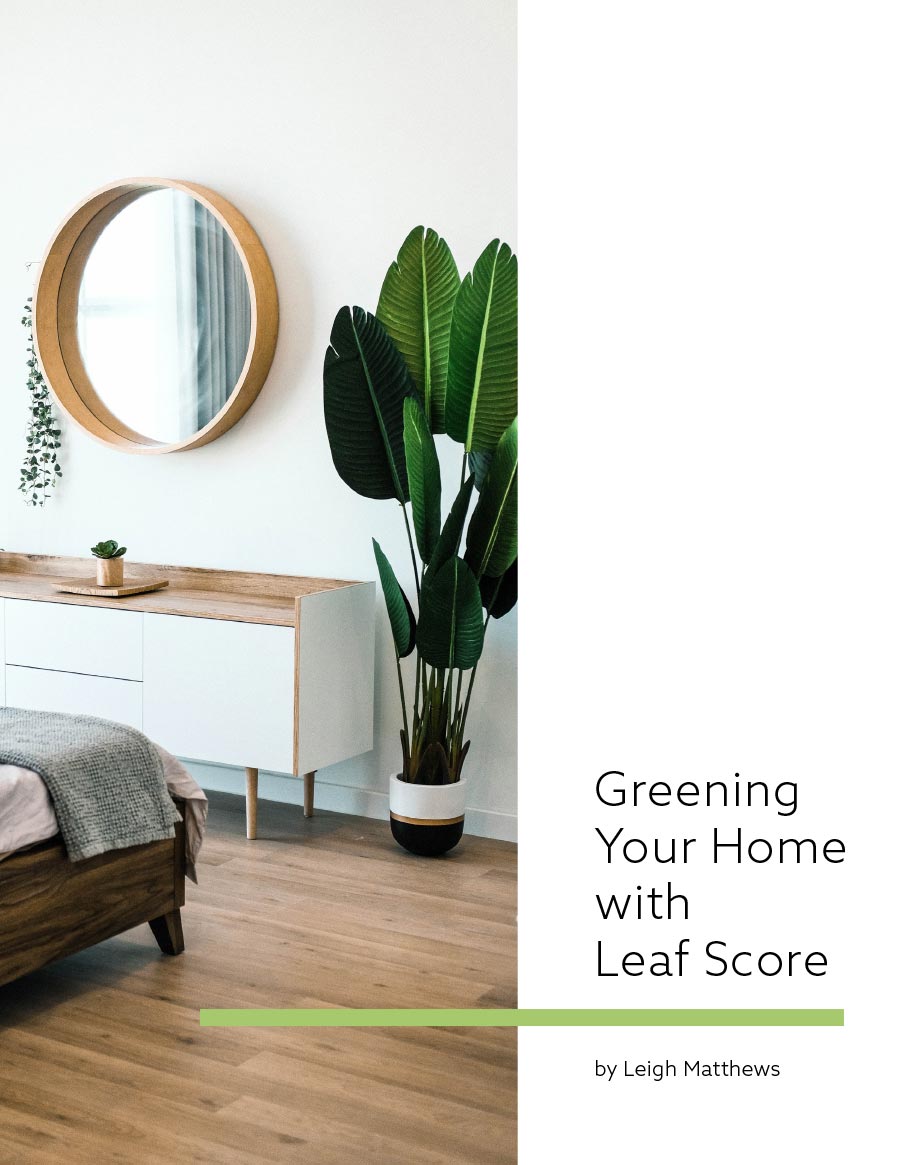
Eco-friendly, non-toxic nursery wall decal alternatives
When you’re shopping for eco-friendly, non-toxic nursery wall decals, check the product details carefully. Ideally, your nursery decals will be made by a company that clearly demonstrates their abhorrence of VOCs. Better yet, the company will not try to greenwash with claims over soy-based or water-based chemicals that aren’t fully detailed.
If a decal is vinyl or the listing doesn’t say what it’s made of, look elsewhere. And, even if the decal is free from vinyl, PVC, formaldehyde, and phthalates, ask what it is made from.
Don’t want to go through the rigamarole of scouring safety data sheets? There is an alternative. If you’re feeling creative, get busy with some paper, wood, or metal stencils and non-toxic paints, or freehand something fun. No artistic leanings or skills? Eco-friendly wall stickers make things a lot simpler, especially late in pregnancy!
Some nursery decals are made with biodegradable, adhesive fabric and are totally non-toxic and peelable. You can reposition these as much as you like. And if you move house or your kid moves rooms, these stickers can move too.
Most conventional plastic decals are expensive one-time stickers, piling on the pressure to get it right the first time! Not easy to do if you’re working with multiple stickers to create a scene. Get it wrong, or want to repaint, and you have to scrape these off and buy a new set. There’s also no scope for using these for another child or gifting them to family or friends once you’re done. Peelable stickers are clearly more eco-friendly as they can be reused time and again, helping to save resources (and money!).
How to use reusable nursery decals
As a general rule with reusable peelable wall decals, you’ll want to use a smooth, clean wall. Avoid using soap and just use water to clean the wall, then let it dry fully before applying the stickers. If you’ve just painted, wait at least 30 days before putting up decals. Otherwise the adhesives may interact with the paint before it is completely dry, and bubbles and wrinkles can form from off-gassing paint.
If ordering well in advance, be aware that some decals have to be ‘activated’ within a certain time, however. Check the product details to make sure your stickers will still stick after a few months in storage. It’s also important to ensure that wall decals are out of reach of children under 3 years of age. These stickers, if peeled, can quickly become a choking hazard.
Most of my top picks for nursery wall decals use PhotoTex, a biodegradable, patented polyester material. On the PhotoTex website you can see their technical specifications, their most recent (2018) safety and compliance test results for lead and phthalates and their 2020 LEED certification. PhotoTex contains no glycol-ether or formaldehyde in the adhesive, no phthalates, and is also certified as low VOC.
All in all, peelable and reusable stickers are a great way to give a boring nursery a boost. No need to paint or otherwise redecorate, which saves you time and money, and helps save resources too!
The best non-toxic and eco-friendly nursery decals

One Trick Pony (formerly Koko Kids)
Highlights: Eco-friendly, reusable, non-toxic sticker sets shipped in compostable cellophane and cardboard. Personally tested and highly recommended!
One Trick Pony is my top pick for eco-friendly, non-toxic nursery wall decals. Formerly known as Koko Kids, this company makes gorgeous peelable, reusable, non-toxic wall decals using a biodegradable, patented polyester material called PhotoTex. The decals are free from vinyl, PVC, BPA, and phthalates and are printed with aqueous inks, not solvent. One Trick Pony rolls and wraps the decals in compostable cellophane and mails them in recyclable cardboard tubes, making them the most eco-friendly nursery decals I’ve found! The only downside? This is a UK-based company, so in addition to more transport-associated emissions, you may experience a slight delay in shipping if you’re stateside (though mine arrived pretty quickly to Canada!).
We used One Trick Pony Wall Decals in our baby’s nursery, read my full review, here.
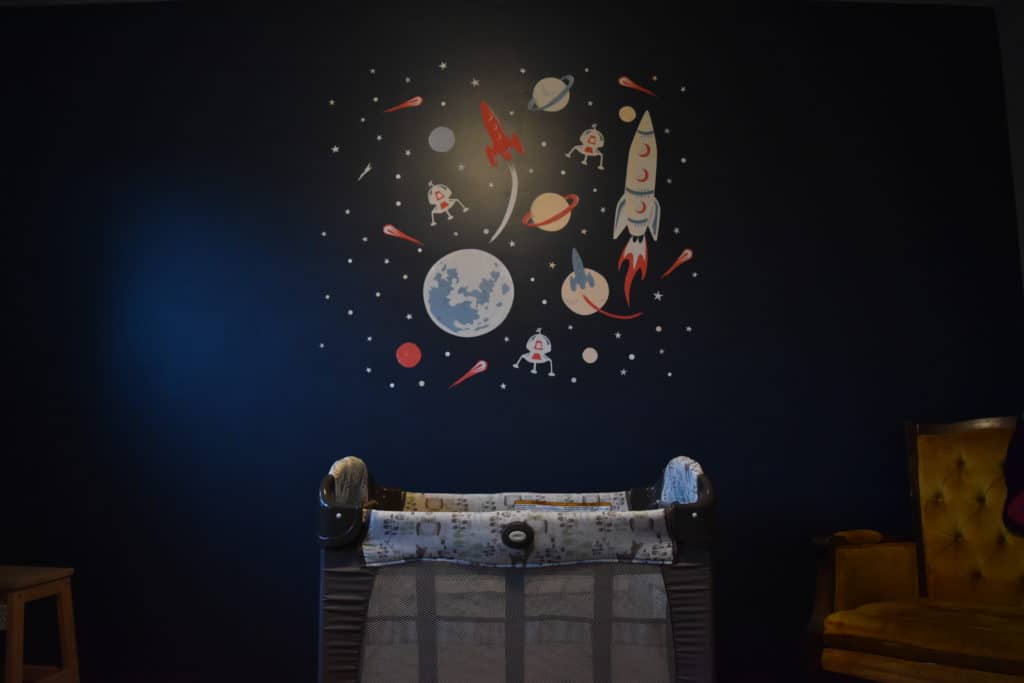

Sunny Decals
Highlights: Fun peelable wall decals designed and manufactured in Los Angeles. Lots of cute modern and traditional designs made with non-toxic and biodegradable materials. Customized designs available!
Sunny Decals is another great company to check out for eco-friendly decals. This Los Angeles-based company creates nursery decals using a fabric material made with natural fibers (polyester). Like One Trick Pony, Sunny Decals prints its stickers using eco-friendly, lead-free ink. The water-based adhesive is non-toxic and the stickers are biodegradable and phthalate-free.
These stickers, if treated properly, can have a lifespan of 5-7 years. Once you’re done with them, the stickers can biodegrade! These stickers can also work on some types of textured wall, but you’ll want to check first before buying a whole set.
Choose from airplane decals, dinosaur decals, jungle decals, hot air balloons, candy wall decals and more. Sunny Decals can also customize their designs with different sizes and colors, with some restrictions.

Made of Sundays
Highlights: Swedish company making super cute reusable decals that are free of plastic, phthalates, solvents, and are fully recyclable and shipped in eco-friendly packaging. Samples available!
Made of Sundays is a Helsinki-based company making completely plastic-free wall decals. They design and print sustainable, fun and easy to use wall decals and wall decoration in their studio in Finland and offer worldwide shipping.
The decals are made without phthalates, plastics, or solvents, have a matte finish, and feel soft like traditional wallpaper. The company uses FSC-certified paper and you can recycle the stickers once you’re done! They’re easy to remove and reposition, and you can request a sample to test on your walls (they work best on smooth indoor surfaces, not textured walls). If your stickers don’t stick for any reason, they will work with you to figure out why and, where necessary, replace them with stickers printed on latex-saturated paper that is a bit sturdier.
Made of Sundays offer the opportunity to add a donation at checkout, to help support the education of girls worldwide (which is one of the most effective ways to support the environment). The company is very eco-minded and limits resource use in production and packing. Their printing process is very efficient and uses solvent-free latex colors, and packing is mostly cardboard, paper, and compostable cellophane where necessary. This is a small, family-run business where the employees clearly have a lot of fun!
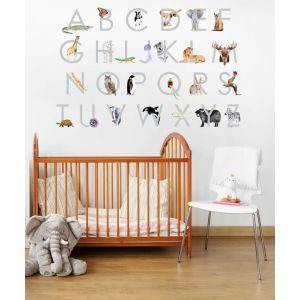
Oopsy Daisy
Highlights: A family-run company that has expanded to encompass hundreds of artists designing gorgeous peelable fabric wall decals. Great for really big decals that transform a room in a flash.
Oopsy Daisy offers peelable and repositionable fabric wall decals printed in the US with non-toxic inks. They are a great option for larger decals and can transform your nursery in mere minutes! These decals are printed with Greenguard Gold certified inks and are UL Environment Energy verified.
Oopsy Daisy is a fab company that has grown from two parents looking for a better way to introduce art to their growing family to a collective of more than 300 artists and 30 team members. The company supports the Boys & Girls Club of America and also offers unique art prints specifically created with kids in mind.
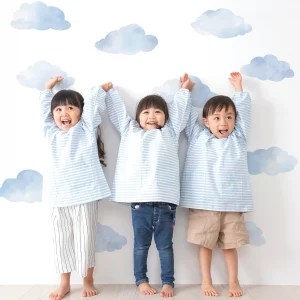
Wall Dressed Up
Highlights: Biodegradable, peelable wall stickers that are phthalate-free but printed with eco-solvent ink in Kansas.
Wall Dressed Up also offers some eco-friendly peelable, biodegradable polyester fabric wall stickers and decals that are phthalate-free and made with LEED certified, Greenguard Gold certified patented material. However, the company prints their designs using eco-solvent ink, so these decals may still off-gas at first.
Wall Dressed Up also sells vinyl wall decals (which aren’t reusable, eco-friendly, or non-toxic), so be careful to check product descriptions. The company designs, prints, and ships decals from its Kansas City studio.
Other options to consider
Eco Wall Decals makes eco-friendly, non-toxic decals in Portland using fabric weave that is PVC-free, with water-based adhesive. I particularly like their branch and sloth decals!
Chocovenyl makes recyclable fabric decals using water-based adhesives. The decals are printed with Greenguard Gold certified ECO-SOL MAX inks (eco-solvent inks, which will still off-gas at first).
Pop & LolliTM makes decals in the US using finely woven polyester fabric, water-based adhesives, and eco-solvent inks. These inks give the decals a semi-gloss UV protective coating, resulting in a 7-10 year indoor lifespan and 5-7 years outside. You have to ‘activate’ these stickers within 3 months of production to ensure stickiness long-term.